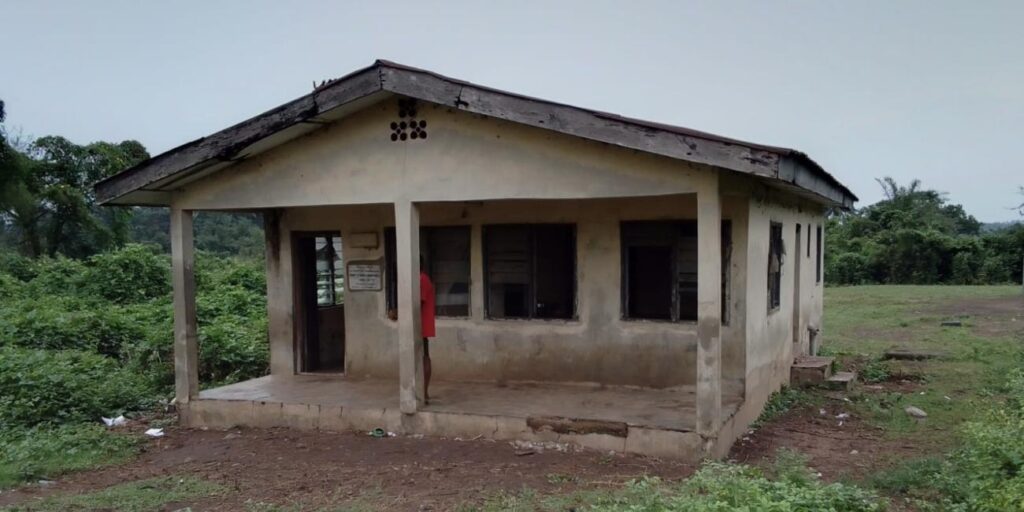Today, the health post is a hollow structure, stripped of its purpose and left to deteriorate. The walls that should offer healing and comfort now crumble under the weight of time and abandonment.
Kitibi Health Post presented a stark contrast to the bustling activity one would expect from a healthcare facility. Instead, an unsettling silence hung in the air, betraying a sense of neglect and disinvestment.
In the past, this location was likely a hub of activity, filled with the sounds of crying infants, anxious mothers, and medical personnel attending to their duties. These days the breeze murmurs through shattered panes bringing tales of the past and possibilities for the future.
Kitibi Health Post sits quietly in Egbedore Local Government Area of Osun State, serving Kitibi and five neighboring communities—or rather, it used to the communities, Orodata Science, a civic-tech organisation observes.
Today, the health post is a hollow structure, stripped of its purpose and left to deteriorate. The walls that should offer healing and comfort now crumble under the weight of time and abandonment.
“Kitibi used to be our pride,” an elderly man said, his voice thick with emotion. “If your child fell ill, you didn’t panic. You knew help was just a short walk away. Pregnant women were safe here. They delivered their babies without fear.”
He looked over the building trying to find traces of those memories, but nothing remained. Damaged ceilings, broken windows, and doors clinging to their frames were what was left.
Inside, the story worsens. There are no hospital beds, no consulting rooms, and no waiting area.
The pharmacy shelves are empty, their dust-covered surfaces a testament to years of neglect. There isn’t even a single health worker on sight—no doctors, no nurses, no community health extension workers. The silence isn’t just haunting; it’s damning.
When the facility functioned, it was a lifeline for six communities. Today, those same people are left to fend for themselves. Mothers must endure long, expensive journeys to distant hospitals, often arriving too late.
Those who can’t afford the trip are left to rely on traditional remedies or prayers. The result? Preventable deaths that should weigh heavily on all of us.
“Look around,” a young man said, gesturing toward the health post. “Does this look like a place meant to save lives? Even the roof leaks. When it rains, we run out of the building because we fear that it might collapse.”
The problems at Kitibi Health Post are not just physical. They’re systemic. There’s no electricity, no water, no ambulance. Staff recruitment hasn’t happened in years, and training for health workers is unheard of.
The community has taken it upon itself to clear the grass around the facility, not out of hope but out of necessity—snakes have made it their home.
Medical supplies are non-existent. Not a single syringe, bandage, or disinfectant can be found here. Equipment for basic healthcare—blood pressure monitors, thermometers, even drip stands—are missing. And the few times patients come, they are not greeted with care but with the stark reality that this health post is no longer a place for healing.
And yet, in the face of all this, the people of Kitibi refuse to give up. Their resilience is as unyielding as the sun that beats down on the health post’s cracked walls. They speak of what the facility meant to them, not in bitterness but in longing.
“This place saved lives,” one woman said, cradling her baby. “It can save lives again.”
Walking through the ruins of Kitibi Health Post, one couldn’t help but feel the weight of their hope. They don’t ask for luxury. They don’t demand miracles. All they want is the basics—a roof that doesn’t leak, a nurse to care for their children, a place where women can give birth safely. It’s not too much to ask. Or is it?
Kitibi’s story is not unique. Across Nigeria, countless health facilities mirror its decay and abandonment. But behind each broken building is a community clinging to hope, waiting for someone to listen, someone to act.
During the visitation to the health post, an elderly woman appealed for help with a note of frustration and determination.
“Don’t just write our story,” she said. “Make them hear us. Let them know we’re still here.”
The silence around Kitibi Health Post speaks volumes, but the voices of its people speak louder. The question is, who will answer?
Want to learn more about the state of primary healthcare in Nigeria? Check out stories and insights on www.checkmyphc.org and explore the data yourself.

